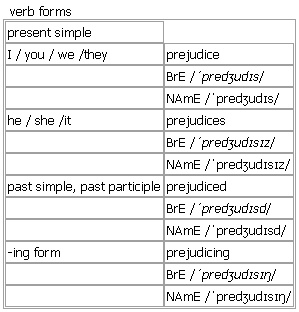|
Từ điển Oxford Advanced Learner 8th
 prejudice
prejudice

preju·dice [prejudice prejudices prejudiced prejudicing] noun, verb BrE [ˈpredʒudɪs] NAmE [ˈpredʒudɪs]
noun uncountable, countable
an unreasonable dislike of or preference for a person, group, custom, etc, especially when it is based on their race, religion, sex, etc
•a victim of racial prejudice
•Their decision was based on ignorance and prejudice.
•~ against sb/sth There is little prejudice against workers from other EU states.
•~ in favour of sb/sth I must admit to a prejudice in favour of British universities.
Word Origin:
Middle English (originally as a legal term): from Old French, from Latin praejudicium, from prae ‘in advance’ + judicium ‘judgement’.
Collocations:
Race and immigration
Prejudice and racism
experience/encounter racism/discrimination/prejudice/anti-semitism
face/suffer persecution/discrimination
fear/escape from/flee racial/political/religious persecution
constitute/be a form of racial/race discrimination
reflect/reveal/show/have a racial/cultural bias
be biased/be prejudiced against (especially BrE) black people/(both especially NAmE) people of color/African Americans/Asians/Africans/Indians, etc.
discriminate against minority groups/minorities
perpetuate/conform to/fit/defy a common/popular/traditional/negative stereotype
overcome/be blinded by deep-seated/racial/(especially NAmE) race prejudice
entrench/perpetuate racist attitudes
hurl/shout (especially BrE) racist abuse; (especially NAmE) a racist/racial/ethnic slur
challenge/confront racism/discrimination/prejudice
combat/fight (against)/tackle blatant/overt/covert/subtle/institutional/systemic racism
Race and society
damage/improve (especially BrE) race relations
practise/ (especially US) practice (racial/religious) tolerance/segregation
bridge/break down/transcend cultural/racial barriers
encourage/promote social integration
outlaw/end discrimination/slavery/segregation
promote/embrace/celebrate cultural diversity
conform to/challenge/violate (accepted/established/prevailing/dominant) social/cultural norms
live in a multicultural society
attack/criticize multiculturalism
fight for/struggle for/promote racial equality
perpetuate/reinforce economic and social inequality
introduce/be for/be against (BrE) positive discrimination/(especially NAmE) affirmative action
support/be active in/play a leading role in the civil rights movement
Immigration
control/restrict/limit/encourage immigration
attract/draw a wave of immigrants
assist/welcome refugees
house/shelter refugees and asylum seekers
smuggle illegal immigrants into the UK
deport/repatriate illegal immigrants/failed asylum seekers
assimilate/integrate new immigrants
employ/hire migrant workers
exploit/rely on (cheap/illegal) immigrant labour/(especially US) labor
apply for/gain/obtain/be granted/be denied (full) citizenship
have/hold dual citizenship
Example Bank:
•It's hard to break down old prejudices.
•It's time to put aside our old prejudices.
•She had never encountered such deep prejudice before.
•She has not been afraid to challenge popular prejudices.
•The tale is told without prejudice or bias.
•We all have prejudices of some kind.
•We must not pander to the irrational prejudices of a small minority.
•a book written to challenge prejudices about disabled people
•deep-rooted prejudice against homosexuals
•prejudice among ignorant people
•prejudice towards immigrants
•Anti-Islamic prejudice has increased considerably in recent years.
•Anti-gay prejudice was extremely common among people in the army.
•He was just talking out of blind prejudice.
•I encountered quite serious prejudice when I worked in the construction industry.
•I'm afraid all the debate did was confirm my own prejudices.
•In any interview, you have to take into account the interviewer's prejudices.
•Irrational prejudice is what drives most racial discrimination in society.
•Prejudice towards new immigrants meant that many were unable to find work.
•There is still widespread prejudice against people who are HIV positive.
Idiom: ↑without prejudice
verb
1. ~ sb (against sb/sth) to influence sb so that they have an unfair or unreasonable opinion about sb/sth
Syn: ↑bias
•The prosecution lawyers have been trying to prejudice the jury against her.
2. ~ sth (formal)to have a harmful effect on sth
•Any delay will prejudice the child's welfare.
Verb forms: 
Word Origin:
Middle English (originally as a legal term): from Old French, from Latin praejudicium, from prae ‘in advance’ + judicium ‘judgement’.
Example Bank:
•Newspaper reports had unfairly prejudiced the jury in her favour/favor.
•She did not disclose evidence that was likely to prejudice her client's case.
•This could seriously prejudice her safety.
•Any delay will prejudice the child's welfare.
•I can't comment on that as I don't wish to prejudice the outcome of the talks.
•Poor handwriting might prejudice people against the applicant.
•Some argued that the media attention had prejudiced the jury.
|
|
|
▼ Từ liên quan / Related words
Related search result for "prejudice"
|
|
